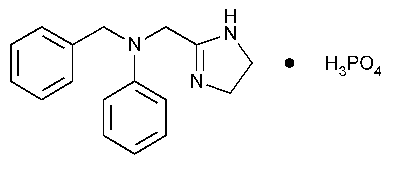Antazoline Phosphate
1H-Imidazole-2-methanamine,4,5-dihydro-N-phenyl-N-(phenylmethyl)-,phosphate (1:1).
2-[(N-Benzylanilino)methyl]-2-imidazoline phosphate (1:1) [154-68-7].
»Antazoline Phosphate contains not less than 98.0percent and not more than 101.0percent of C17H19N3·H3PO4,calculated on the dried basis.
Packaging and storage—
Preserve in tight containers.
Identification—
A:
Infrared Absorption á197Mñ.
B:
The RFvalue of the principal spot in the chromatogram of the Identification corresponds to that of Standard preparation Aas obtained in the test for Chromatographic purity.
pHá791ñ:
between 4.0and 5.0,in a solution (1in 50).
Loss on drying á731ñ—
Dry it at 105 for 4hours:it loses not more than 0.5%of its weight.
for 4hours:it loses not more than 0.5%of its weight.
Chromatographic purity—
Standard solutions—
Dissolve USP Antazoline Phosphate RSin methanol,and mix to obtain a solution having a known concentration of 0.10mg per mL.Quantitatively dilute with methanol to obtain 5Standard solutionshaving the following compositions:
| Standard preparation |
Dilution | Concentration (µg RSper mL) |
Percentage (%,for comparison with test specimen) |
| A | (1in 2) | 50 | 0.5 |
| B | (2in 5) | 40 | 0.4 |
| C | (3in 10) | 30 | 0.3 |
| D | (1in 5) | 20 | 0.2 |
| E | (1in 10) | 10 | 0.1 |
Test solution—
Dissolve an accurately weighed quantity of Antazoline Phosphate in methanol to obtain a solution containing 10mg per mL.
Identification solution—
Dilute a portion of the Test solutionquantitatively with methanol to obtain a solution containing 50µg per mL.
Procedure—
Apply separately 10µLof the Test solution,10µLof the Identification solution,and 10µLof each Standard solutionto a suitable thin-layer chromatographic plate (see Chromatography á621ñ),coated with a 0.25-mm layer of chromatographic silica gel mixture.Position the plate in a chromatographic chamber,and develop the chromatograms in a solvent system consisting of a mixture of ethyl acetate,methanol,and diethylamine (17:2:1)until the solvent front has moved about three-fourths of the length of the plate.Remove the plate from the developing chamber,mark the solvent front,and allow the solvent to evaporate.Examine the plate under short-wavelength UVlight,and compare the intensities of any secondary spots observed in the chromatogram of the Test solutionwith those of the principal spots in the chromatograms of the Standard solutions.[NOTE—Disregard any spots observed at the origins of the chromatograms.]No secondary spot from the chromatogram of the Test solutionis larger or more intense than the principal spot obtained from Standard solution A(0.5%),and the sum of the intensities of all secondary spots obtained from the Test solutioncorresponds to not more than 1.0%.
Assay—
Dissolve about 750mg of Antazoline Phosphate,accurately weighed,in 50mLof glacial acetic acid,and titrate with 0.1Nperchloric acid VS,determining the endpoint potentiometrically,using a glass electrode and a calomel electrode containing a saturated solution of lithium chloride in glacial acetic acid (see Titrimetry á541ñ).Perform a blank determination,and make any necessary correction.Each mLof 0.1Nperchloric acid is equivalent to 36.34mg of C17H19N3·H3PO4.
Auxiliary Information—
Staff Liaison:Elena Gonikberg,Ph.D.,Scientist
Expert Committee:(PA4)Pharmaceutical Analysis 4
USP28–NF23Page 161
Phone Number:1-301-816-8251
